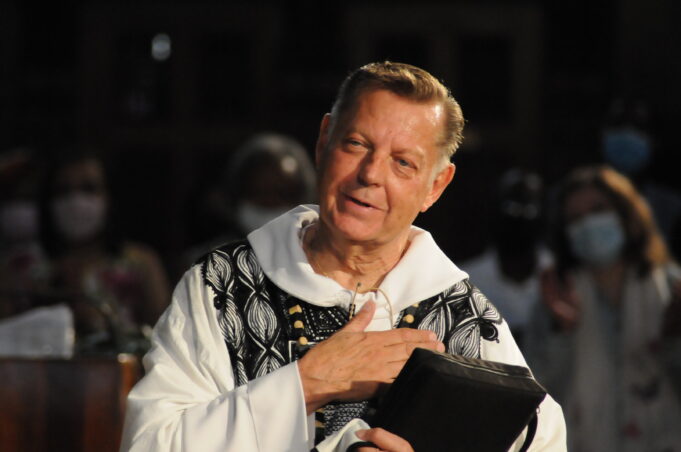Pastor. Preacher. Parent. Lecturer. Activist. “Errand boy.”
Those are the words listed in the biography of Rev. Dr. Michael Louis Pfleger, affectionately known as “Father Mike,” the senior pastor of Saint Sabina Church in Chicago. Father Pfleger has been serving the Black and oppressed communities of Chicago for at least 53 years, advocating against violence and police brutality. So, when sex abuse allegations arose, many in the Black community had no problem standing up for him.
After two brothers from Texas accused Father Pfleger of allegedly abusing them over four decades ago, the Archdiocese in Chicago asked the longtime activist and pastor to step down from the ministry. That was in January. After a four-month long battle, Father Pfleger has now been reinstated, the allegations said to be unfounded. St. Sabina Church held an official reinstatement celebration on June 6 in conjunction with the Feast of Corpus Christ, which is a Roman Catholic festival in honor of Jesus Christ.
Who is this man, who despite opposition, is eager to “get back to work” and “kick the devil’s butt,” remarked Father Pfleger during a May 24 news conference?
He was born and raised on the South Side of Chicago in a White, middle-class community. In an interview with The Final Call, Father Pfleger detailed how his ministry and activism came about from a combination of childhood and young adult experiences. He grew up with an older sister who was mentally challenged.
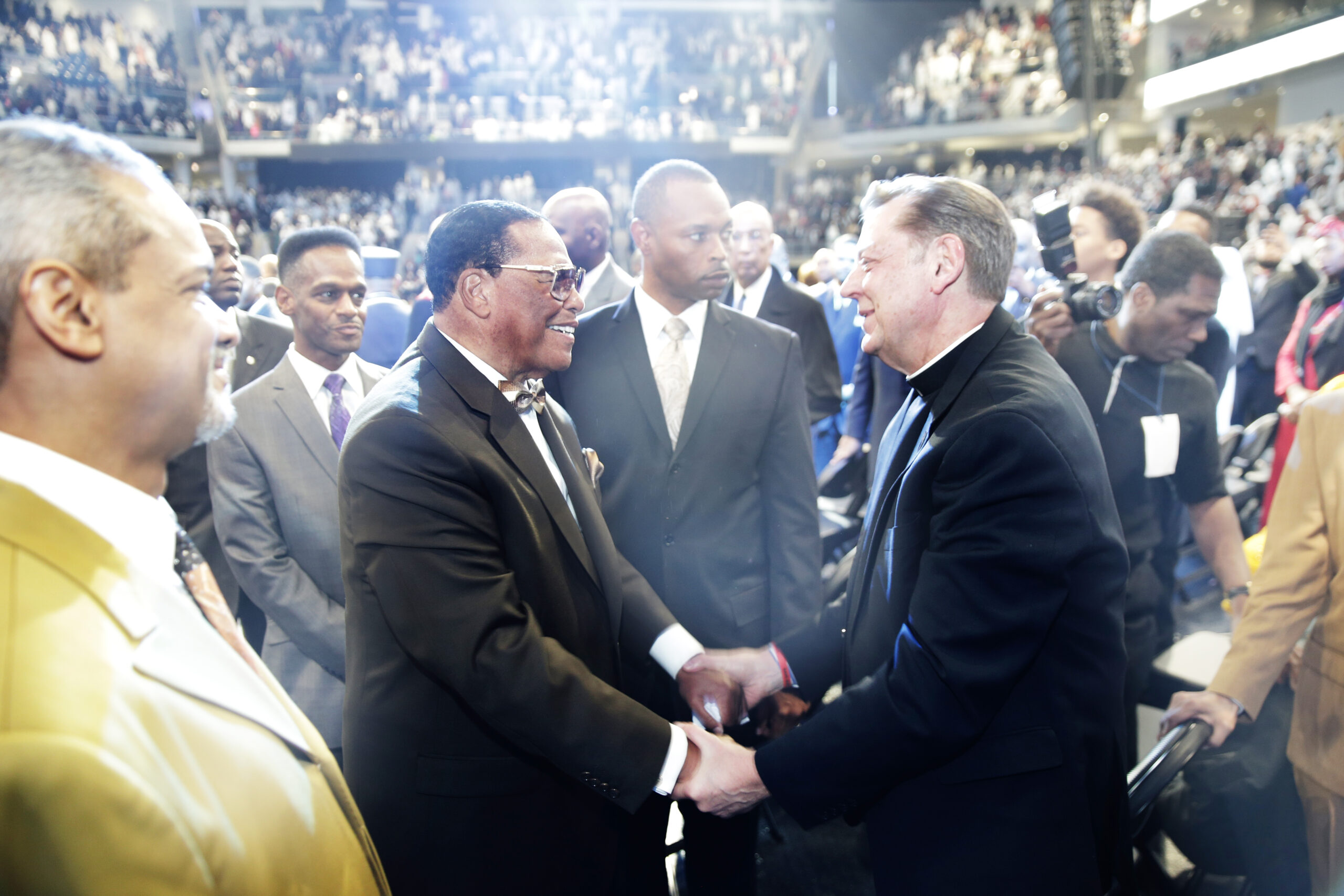
He would watch her as people laughed at her and called her “retarded,” and it would fill him with anger. Then in his first year of high school, he spent two weeks at a Native American reservation in Wilburton, Okla. He went to get ice cream with a few of the young people, but a man told him Indians weren’t allowed.
“I had never experienced anything like that in my life. And so, I remember calling my mother that night and saying, ‘I want to move down here, because they have a lot of problems down here,’ and my mother laughed on the phone and she said, ‘Welcome to America,’” Father Pfleger recalled.
In his junior year of high school, he kept hearing about a “horrible” person named Martin Luther King, who was marching for open, fair and equal housing in Chicago. He heard people cursing Dr. King out and calling him names. One day, he and his friends walked with their three bikes into Marquette Park where Dr. King was speaking that day.
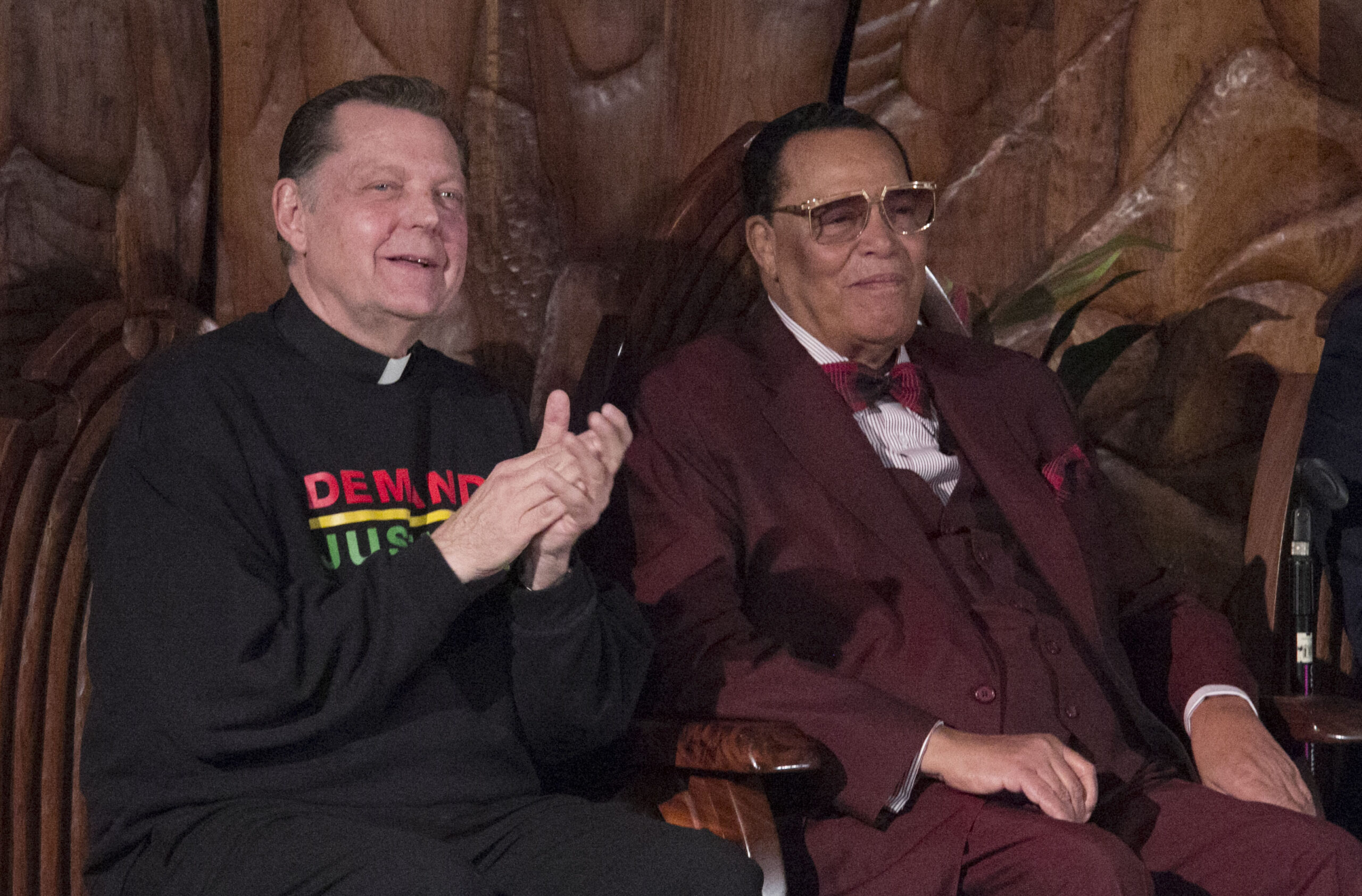
“I saw all this hate. People with all this racist chanting and throwing bottles and rocks, turning over cars and it was just, I never saw anything like that,” Father Pfleger said. “I realized I recognized some of the people who lived in my neighborhood, went to my church. There were family members of some of my classmates, and I’m seeing that, and I never saw this side of people.”
Despite the chaos around him, Dr. King simply walked through the park. “It was the greatest witness of non-violence I ever saw,” Father Pfleger described. “I remember riding back that day and saying, there’s something about this guy. Either he’s crazy, or he has some kind of power about him.”
Dr. King became an inspiration to Father Pfleger. Illinois state Senator Jacqueline Collins, who has been a member of St. Sabina for over 35 years, told The Final Call that the pastor was influenced by Dr. King’s words: “Any religion that professes to be concerned with the souls of men and is not concerned with the slums that damn them, the economic conditions that strangle them, and the social conditions that cripple them is a dry-as-dust religion.”
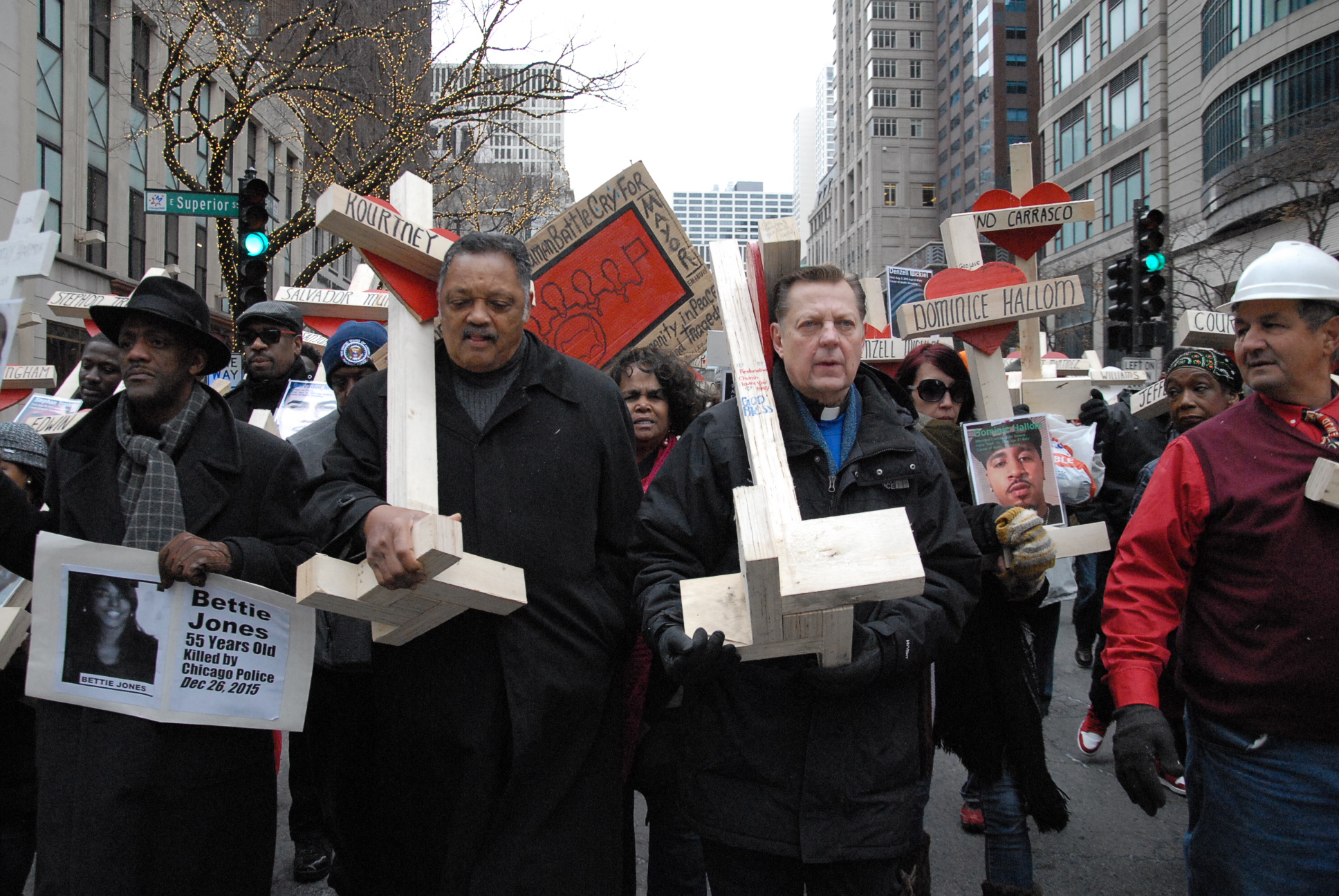
Father Pfleger became the pastor of St. Sabina in 1975, and in the 80s, he protested South Africa’s apartheid system, launched an anti-drug paraphernalia campaign and launched a “save our children” campaign.
“He’s a peace advocate. Back in 1991, he took an anti-war stance, protesting when President George H.W. Bush instituted the Gulf War,” Sen. Collins said. She said for the last 10 or more years, Father Pfleger has been combating youth violence and gun violence.
When Sen. Collins first walked into St. Sabina Church over 35 years ago, she was very impressed with its decor.
“Father Mike has made it a point, when he became pastor, to celebrate the cultural richness of the African American tradition and to speak to the cultural and spiritual needs of the Black faithful,” she said. “So, he had the decor. You have the African motif in the church. If you’ve ever been in St. Sabina, you’ll see the kente colors, fabrics. The altar is shaped like the African drum. The woodwork and the motif really celebrates and announces that we are proud to be a prophetic church with a strong Black tradition of witness and worship.”
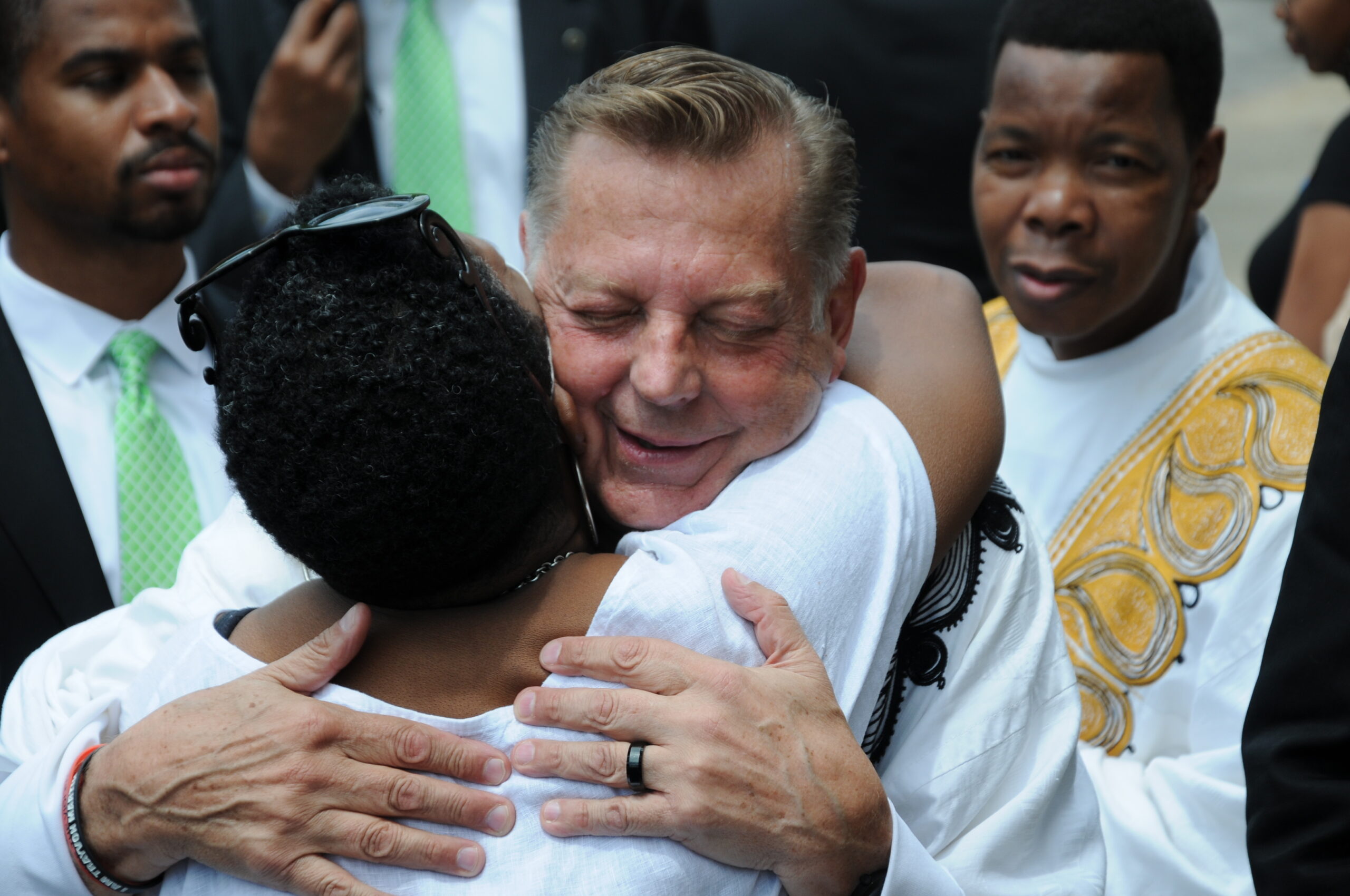
Under the leadership of Father Pfleger, St. Sabina now has several outreach programs: an education academy, an elder’s village, an employment resource center, a youth program called the Ark, a violence intervention program and learning gardens.
In Dec. 2019, the academy’s principal reported an enrollment of 221 students. According to the school’s website, 81 percent of St. Sabina alumni from the academy enroll in college immediately after high school. Colleges range from HBCU’s to Ivy Leagues. The elder’s village, which opened its doors in Sept. 2000, has 80 one-bedroom units for senior citizens. The program ‘Ark’ represents 634 students from 91 schools across the city of Chicago. A 2018 survey of Ark participants revealed that over 50 percent of 12–18-year old’s improved their grades as a result of the program.
Father Pfleger has formed many friendships within the Black community, including one with the Honorable Minister Louis Farrakhan of the Nation of Islam. He said he couldn’t recall when exactly he first met the Minister, but through Claudette Marie Muhammad, former national protocol director and another Muslim sister who was close to the Minister, he was invited to a dinner at the Palace, the Minister’s home, with a group of other pastors.
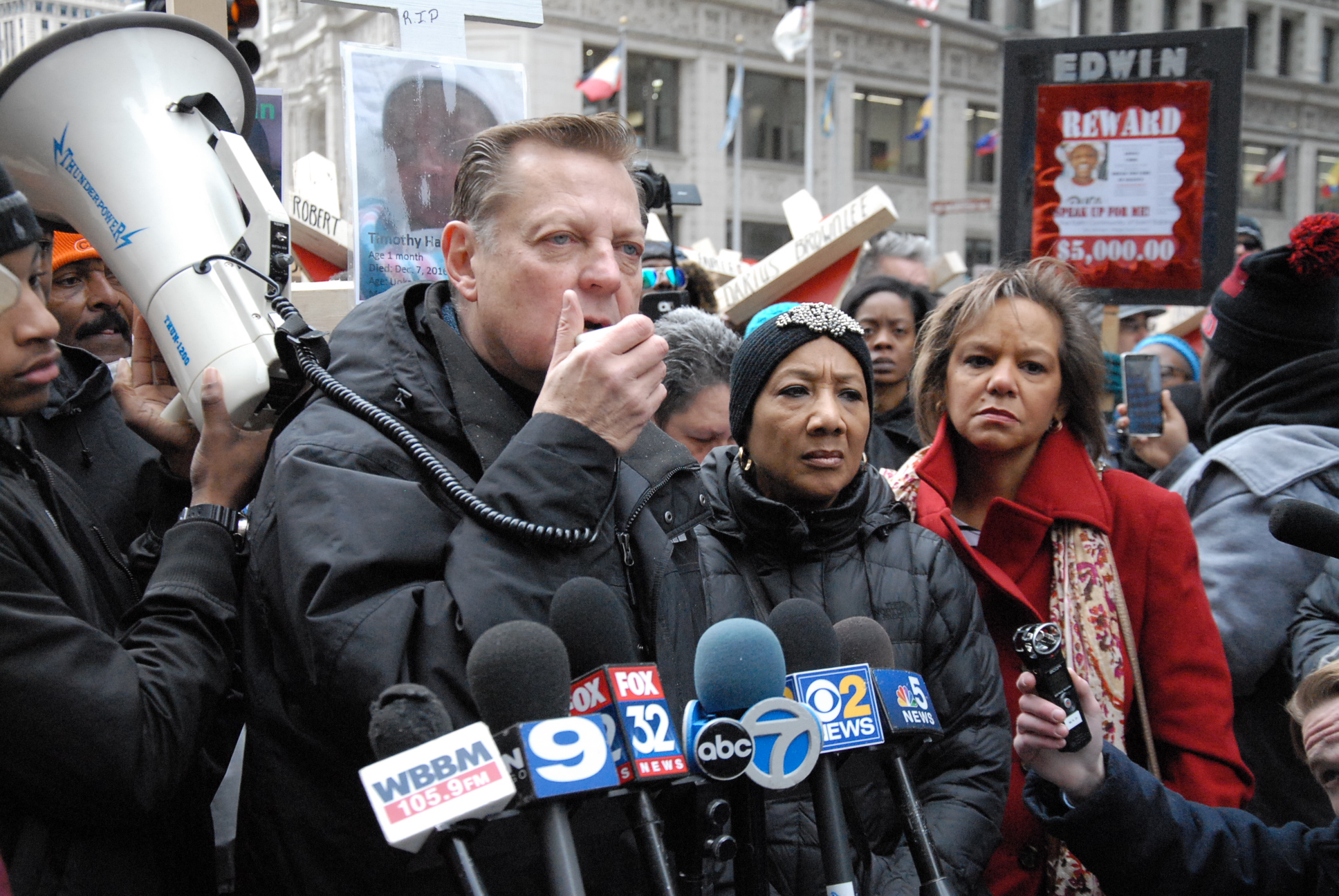
“I was just overwhelmed. I sat there very quietly. I was the only White person at the table, and kind of overwhelmed with the kindness and the wisdom of the Minister. And so, somewhere towards the end of the conversation at the table, I put my hand up and I said, ‘Minister, I would love to have you come speak at St. Sabina,’” Father Pfleger recalled. “And he chuckled. He says father, we’ll speak afterwards.”
Once the dinner was over, Min. Farrakhan told Father Pfleger he appreciated the invitation but to check with the church leadership. “He gave me his number and gave me a Qur’an, and I still have that Qur’an sitting in my room, when he wrote a note into it,” he said.
The Minister was able to speak at St. Sabina in 1988, and from there, the relationship between the two men of faith grew. In May 2019, after the Honorable Minister Louis Farrakhan was banned from Facebook. Father Pfleger invited him to speak at St. Sabina Church.
The Minister has described Father Pfleger as his brother, friend, “a true servant of Jesus the Christ” and “one of the finest men that I’ve had the privilege of meeting since I’ve been here in Chicago.” Father Pfleger attended the historic 1995 Million Man March and subsequent mass gatherings held by the Minister and the Nation of Islam including 10.10.15 commemorating the 20th anniversary of the 1995 march. Father Pfleger has attended the Nation’s annual Saviours’ Day conventions over the years and Min. Farrakhan has spoken several times at St. Sabina.
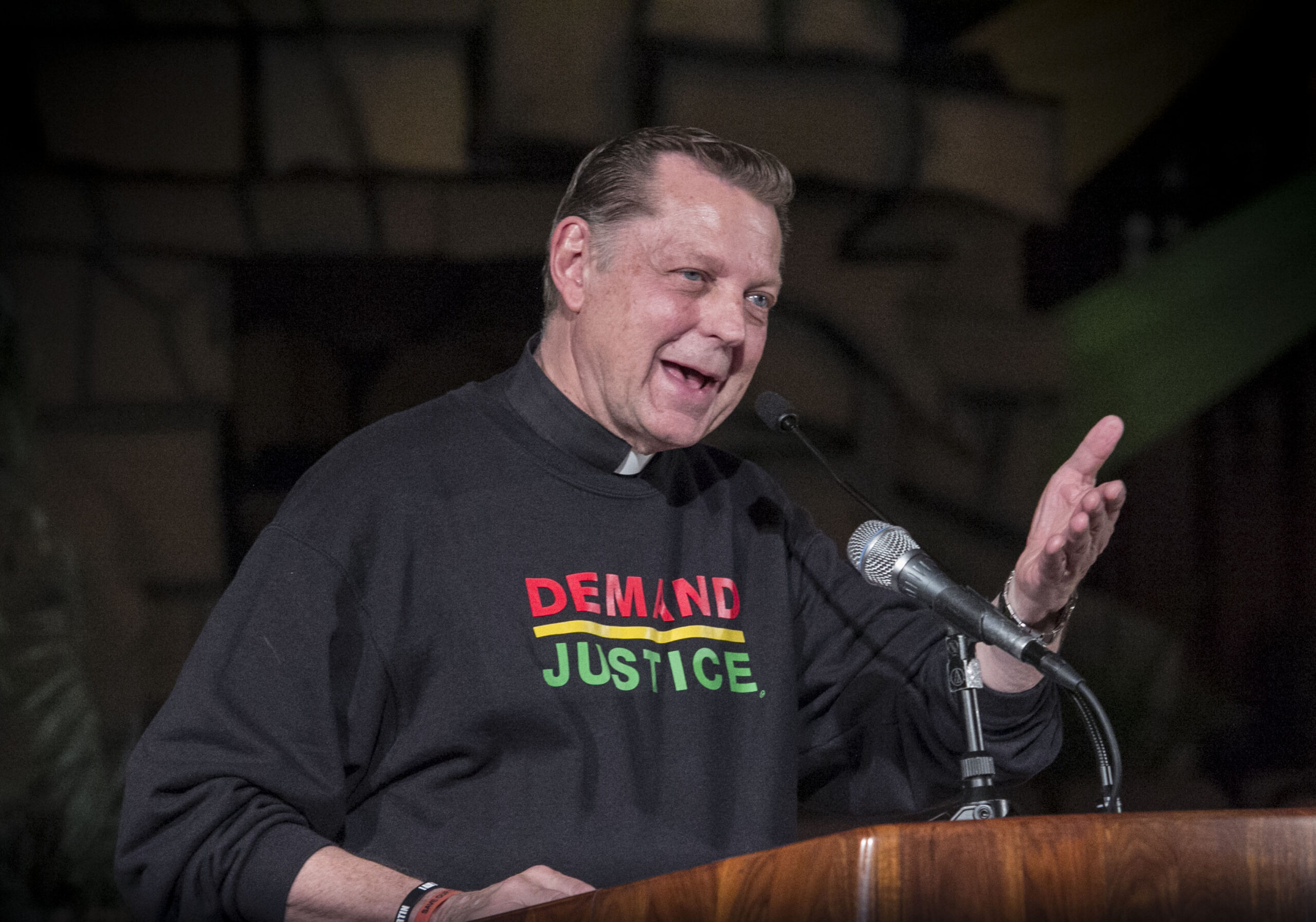
Father Pfleger described Minister Farrakhan as a very loving, gentle man, and yet bold and courageous. “As a result of that, I think anybody, any pastor or preacher today that seeks to be prophetic is a target, and the status quo will turn on you. They can’t fight the message, so they fight the messenger. So they try to destroy the messenger of Louis Farrakhan, to keep people from hearing the message, because if they hear the message, they’ll say, ‘Wow, that’s true. Oh, that’s something. I need to check this out. I need to go further.’”
Wallace “Gator” Bradley, president and urban translator of United in Peace Inc., has stood with Father Pfleger during many protests against senseless shootings and killings. An ex-offender and formerly an “enforcer” of the street gang Gangster Disciples, Mr. Bradley said Father Pfleger stood with him in his efforts to get pardoned. “He’s a man of conviction. And what I love about him, he stood firm with the leader, Minister Farrakhan. That’s his brother, and he let it be known to the world,” Mr. Bradley said.
James G. Muhammad, former editor of The Final Call, described Father Pfleger’s congregation as ‘spirited’ and his leaderships style ‘progressive.’ He mentioned how the pastor has an open door to the Nation of Islam and vice versa. In talking about the relationship between the two faith leaders, Minister Farrakhan and Father Pfleger, he said they both see themselves as true servants, and he lifted the scripture that there is no division in Christ.
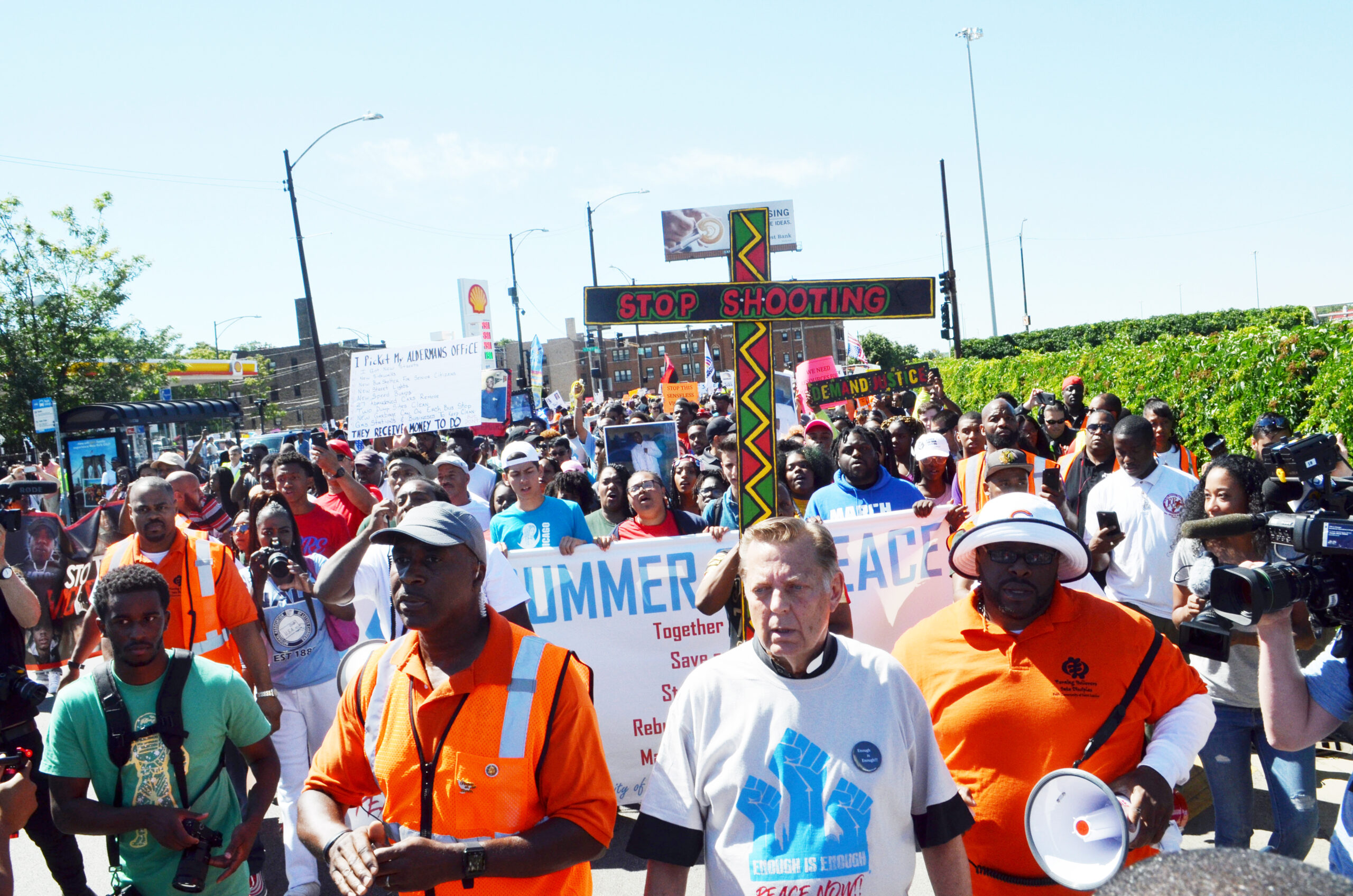
“They put aside labels. They don’t hold a label up before the needs of the people and what needs to be done,” Mr. Muhammad said.
He described Father Pfleger’s approach as one where he’s out in the community instead of just sitting in his seat giving directions. “He’s out in the streets stopping the violence, just as our brothers, as FOI and MGT (men and women of the Nation of Islam), we’re out in the streets embracing the downtrodden and picking them up, and that’s his approach as well,” he said. “That’s his legacy.”
Father Pfleger called America a “country that hates truth.” As someone that people have called a truth-teller, he has had his own challenges. He was suspended from the ministry twice: once for calling out Hillary Clinton as “entitled” when she ran against Barack Obama in the 2008 presidential election, and another time when his words on Dr. Cornel West’s radio show were taken out of context.
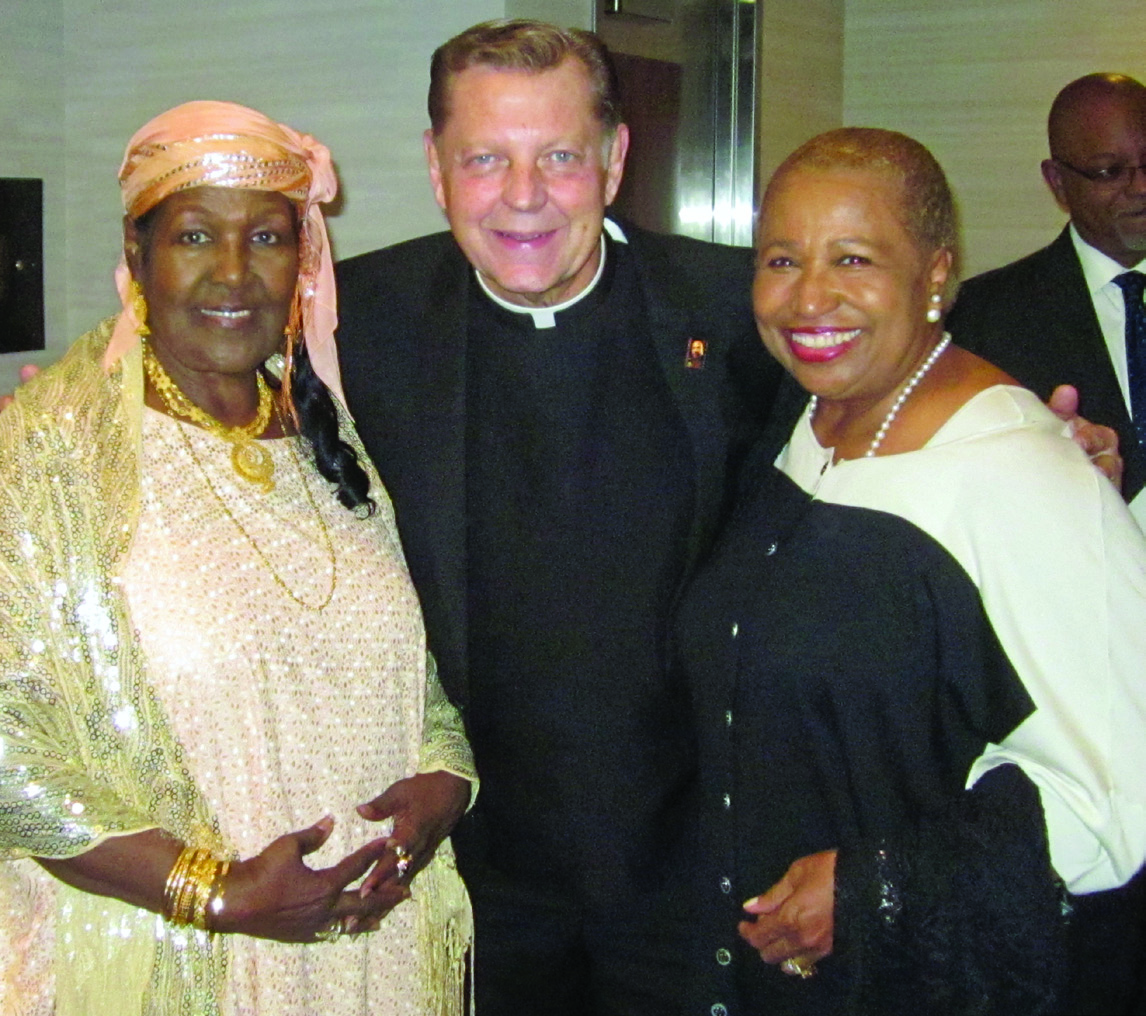
“I’ve had this kind of rugged relationship for a long time in the Catholic Church. I remember one of the headlines of the paper was said by a bishop here in Chicago, ‘Maybe Father Pfleger shouldn’t be a Catholic priest.’ I said, you wake up and see your boss telling you maybe you shouldn’t be a Catholic priest, it’s not the most affirming thing in the world to wake up to,” he said.
He said, there were always things in the Catholic Church that he disagreed with. “I think that’s our job as pastors or imams or rabbis to be faithful to the Qur’an, to the Torah or to the Bible. So, I’ve tried to always be there, and it’s created a lot of tension in the Catholic Church,” he explained. “People always joke about the fact that the Catholic Church has wanted to get rid of me forever.”
When the recent sex abuse allegations arose, he was given two hours to tell his staff and to find a place to live. “I was numb. I was in shock,” he expressed. He remembers sitting in his one-bedroom apartment the first night and not being able to sleep.
“I’m, number one, a people person. Secondly, I work 12-13 hours a day, every day. It’s my life. And then you’re separated from your work, you’re separated from your people, your home. And it’s very isolating and very painful,” he described.
He thanks God for the people who loved him, cared for him and checked up on him. There was a moment when he felt sorry for himself for feeling unjustly treated and abandoned, but he said he then thought about the mother who is at the morgue identifying her child who was shot and killed last night; the child afraid to go to school; the mother or father struggling to feed their children; the people in jail who were falsely accused and don’t have a church family, friends or lawyers on their side.
“I would just have to slap myself and say, ‘you know what Pfleger? You’re blessed. Don’t feel sorry for yourself.’ Yes, this is hard. Yes, this is difficult. Yes it’s unfair, but when you put things in perspective, you’re blessed,” he expressed. He said some of the wounds are still raw, but he’s giving his energy to the work ahead.
“I want to raise up a church family that understands that they must be an invading force in this society, at their workplace, at the marketplace, in their schools, in their homes, on the block, with their family and with strangers. An invading force in a world that I think is so in love with evil right now, and so divided and so selfish, that we must be an invading force of God’s goodness, of God’s justice and God’s presence and power and God’s love,” he said.
Tio Hardiman, president of Violence Interrupters Inc., described Father Pfleger as a messianic leader. Mr. Hardiman listed some of Father Pfleger’s work, including bringing resources to Chicago’s Auburn Gresham community, establishing senior citizen homes, feeding the community, organizing peace concerts and peace basketball tournaments, and sending young men and women to school.
Carolyn Johnson, a Chicago activist, a struggling mother and a survivor, described Father Pfleger as a good man who personally helped her. Father Pfleger is someone God sent, and she questioned why every time Black people have someone to stand for them, evil forces work to destroy the person.
“Father Pfleger is the truth and the light, and I honor God and I thank God for sending that man to help us and help our children and help our babies. Bullets are steady flying, kids are steady dying, and us mothers, we’re steady crying for our loved ones and for us to live a normal, natural truthful life,” Ms. Johnson said.
“I think that’s what Father Pfleger does for me and the people that I’ve been around. I’m tired of the lies. I’m so tired of the lies, and every time we find someone that steps up for us, they try to get rid of them.”
Sen. Collins said she believes Father Pfleger came out of the fire stronger. She attributed him as the reason she ran for office, and she said his ministry reflects his compassion, courage, integrity, and character.
“I think this crisis has made him come out on fire even more determined and confident of his destiny and his calling. So, whatever other misgivings he had about, was the priesthood the place for him, was it the right calling for him, I think now more than anything else, it’s a manifestation and a definite affirmation that he is in the place where God has placed him to do the work that he’s been called to do in his priesthood, in his ministry,” she said.
“So I expect greater things. Higher levels of activism and advocacy. I think his voice will become more energized.”












